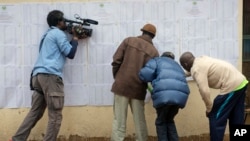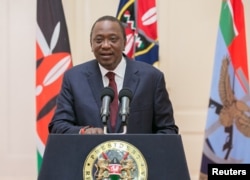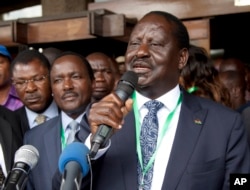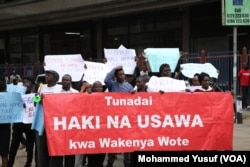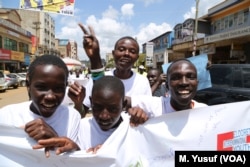Kenya's President Uhuru Kenyatta has urged his country's voters to cast their ballots in peace and make Kenya's founding fathers proud of them.
In one of the most closely watched races on the African continent, Kenyatta is facing off against his longtime rival, opposition leader Raila Odinga, in Tuesday's presidential vote. The race is projected to be tight.
"Ask every single eligible citizen to turn out tomorrow in great numbers to do that which our democracy entities you to do — vote for the candidate of your choice," Kenyatta said in an election-eve broadcast Monday.
He urged citizens to go home after they vote, shake their neighbor's hand, have something to eat and wait for the election results together.
Kenyatta and Odinga ran against each other in the 2013 presidential election, and many Kenyans say the campaign never stopped.
"There's a sense in which the elections have occupied the collective national consciousness of the Kenyan citizen and the voter, so it's a big deal," said Kenyan political writer and commentator Barrack Muluka.
But more than the presidency is on the ballot.
Ipsos research analyst Tom Wolf believes that the 47 county races are generating at least as much attention as the presidential contest, definitely more so than in 2013, he says.
"But maybe Kenyans, and we’ve seen this in our polling data, did not fully understand or appreciate just how much power or responsibility was being devolved from the center to the regions, for the counties," said Wolf. "So if you go and travel around the counties now, you will see as much, if not more, campaign activity that’s associated directly for the contest for governor as there is for the presidency."
The organization of the polls has been a source of tension for more than a year, sparking opposition protests and several court battles.
Complicating matters is the recent killing of the electoral commission’s technology chief, Chris Msando. Autopsy results show he was tortured and strangled. Msando was responsible for the electronic voter identification and vote transmission systems.
"There’s every possibility of people tying that passing on to the elections and to the possibility that there could be foul play," said Muluka. "Remember we are not saying that there’s definitively anything like that, but the context opens up space for that kind of speculation."
And that hasn't been the only drama in the home stretch of Kenya's campaign season. Someone broke into the vice president's country home on July 29. The opposition said that men dressed in plain clothes raided one of its offices last Friday. Also on Friday evening, two of the opposition's foreign electoral advisers, an American and a Canadian, were seized from their apartments and deported.
Fake news has also been a problem. A GeoPoll survey showed 90 percent of respondents said they have seen "false or inaccurate information" around the elections, and 87 percent viewed such reports as "deliberately false."
For at least a week, people have been leaving Nairobi and other towns for their home villages; some for voting purposes and others for fear of violence.
Lane Bunkers is the country representative for Catholic Relief Services in Kenya. He says that against the backdrop of the election season, Kenyans are still suffering from problems resulting from a regional drought emergency, like food insecurity and high food prices.
"There are a lot of serious challenges facing the people of this country, so I’m hoping for a strong outcome with elected politicians who will take their jobs seriously, and really perform for the people who are electing them," Bunkers said.
Young people took to the streets of Eldoret on Friday to march for peace. Kenya's Rift Valley region was the epicenter of post-election violence in 2007 and 2008 that killed more than 1,000 people and displaced over half a million.
Kenyans hope these elections will be free of violence.
VOA's Kenneth Schwartz contributed to this report.




